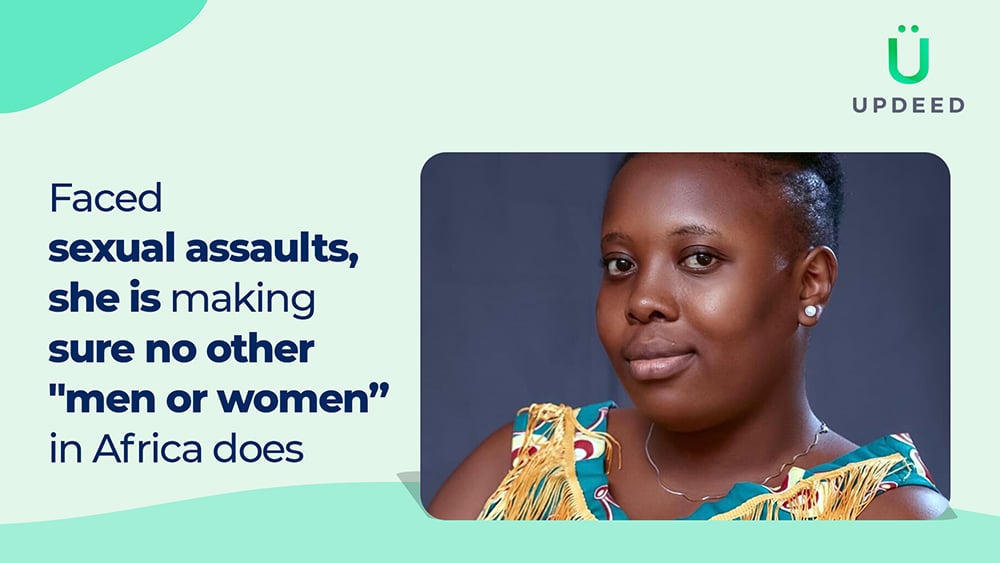Faced sexual assaults, she is making sure no other “men or women” in Africa does
A staggering one in every three women has been subjected to physical abuse, coerced into sexual activity or otherwise mistreated, often by a perpetrator known to her, according to the World Health Organisation (WHO).
Shockingly, one in five women has suffered sexual abuse during childhood. Unfortunately, Tembeng Eli-Anne, a social activist from Cameroon (the Central African country), had gone through such violence.
Anne got accepted into the Young African Leaders Initiative Program for West Africa and went to Ghana in March 2018. Thereafter, she shared her survivor story online.

“Between the ages of seven and nine, I was repeatedly raped by my cousin, a neighbour, and a female family friend. After ten years, a close friend again sexually assaulted me after removing my sanitary pad. These violent incidents left a very strong impression on my mind,” said Anne while talking to UPDEED.
It caught many people off guard because they couldn’t fathom that she had gone through such a harrowing experience. This was because they had the misconception that most survivors remain introverted and uncommunicative, whereas she had always been lively and playful.
From then on, as a Comprehensive Sexuality Education enthusiast, Anne wishes to have a community where parents/guardians freely engage their children on the topic and also educate and encourage parents how to start such discussions. Anne became an activist to speak out and empower men, women and girls. She started working against sexual violence and ending rape culture in Africa and founded Hope for a Better Tomorrow (HOBET).
The mission to empower
“I grew up with that mindset of trying to do something for these people. Over the years, the people I have trusted the most, those who were so close to me, turned out to be the worst nightmares of my life. Growing up and watching young girls and women around me facing domestic violence and sexual abuse regularly, I was determined to do something,” said Anne.
“And this motivated me to start HOBET to empower women and girls in coping with the devastating aftermath of sexual assault,” she added.
The work involves identifying survivors and providing them with psychosocial support, counselling, capacity building, and encouraging them to share their stories as part of the healing process.
Anne aims to have self-sustainable communities, but to achieve this, it can only be where there is gender equality and mutual respect. Hence, there is a need to raise awareness, educate people, talk openly, and empower them to raise their voices.
“It will ultimately result in a community where we will be free from rape culture, a community where we do not hear regular reports of sexual-gender-based violence and live with mutual respect,” said Anne.
Anne believes it is impossible to provide all services independently as an organisation. We have an ecosystem of organisations where to work together, we partner together to see that we offer services to survivors of gender-based violence.
Most survivors suffer from post-traumatic stress disorder (PTSD). They keep on thinking that they are worthless and not part of society and remain quiet. Different organisations provide different services to help them come out. HOBET works to identify and counsel these survivors.
Thereafter, an assessment of the survivor is done, where the organisation try to find whether the survivor needs education, financial stability, or is required to be trained with some skill sets.
“Our partner organisations help us in the process. Some provide education, some can help with counselling, some empower them by making them learn certain skills to make them financially independent and medical support,” said Anne.
With the discussion around mensuration still taboo in our system, the organisation aims to provide individuals with a comprehensive understanding of their bodies and the various bodily functions, including sexual education, pregnancy and even the menstrual cycle.
Further, with the socio-political crisis in Cameroon, education, especially for the girl children, is getting hampered.
“Without education, our girls are more vulnerable to gender-based sexual violence, and thereby we are working to collaborate with organisations to empower girls with education and necessary skills to help them survive and support their families,” said Anne.
Anne is working to achieve a society that will be a better place for a girl child, where her voice must not go unheard and where she is free to live a life of dignity.
Conclusion
The staggering statistics from the World Health Organization on violence against women remind us of the harsh reality many individuals face daily. Tembeng Eli-Anne’s survivor story is a testament to the strength and resilience of those who have been victims of sexual violence.
Through her work with HOBET, Anne is empowering women and girls to speak out against gender-based violence and advocating for creating self-sustainable communities based on gender equality and mutual respect.
Ready to make a positive impact in the world?
UPDEED is the place for you. Our free and open platform is filled with inspiring stories from individuals and organizations who are making a difference in their communities and beyond. Connect and collaborate with like-minded individuals from around the globe on UPDEED, and discover your own potential to create meaningful change. Join our community and make a difference.





